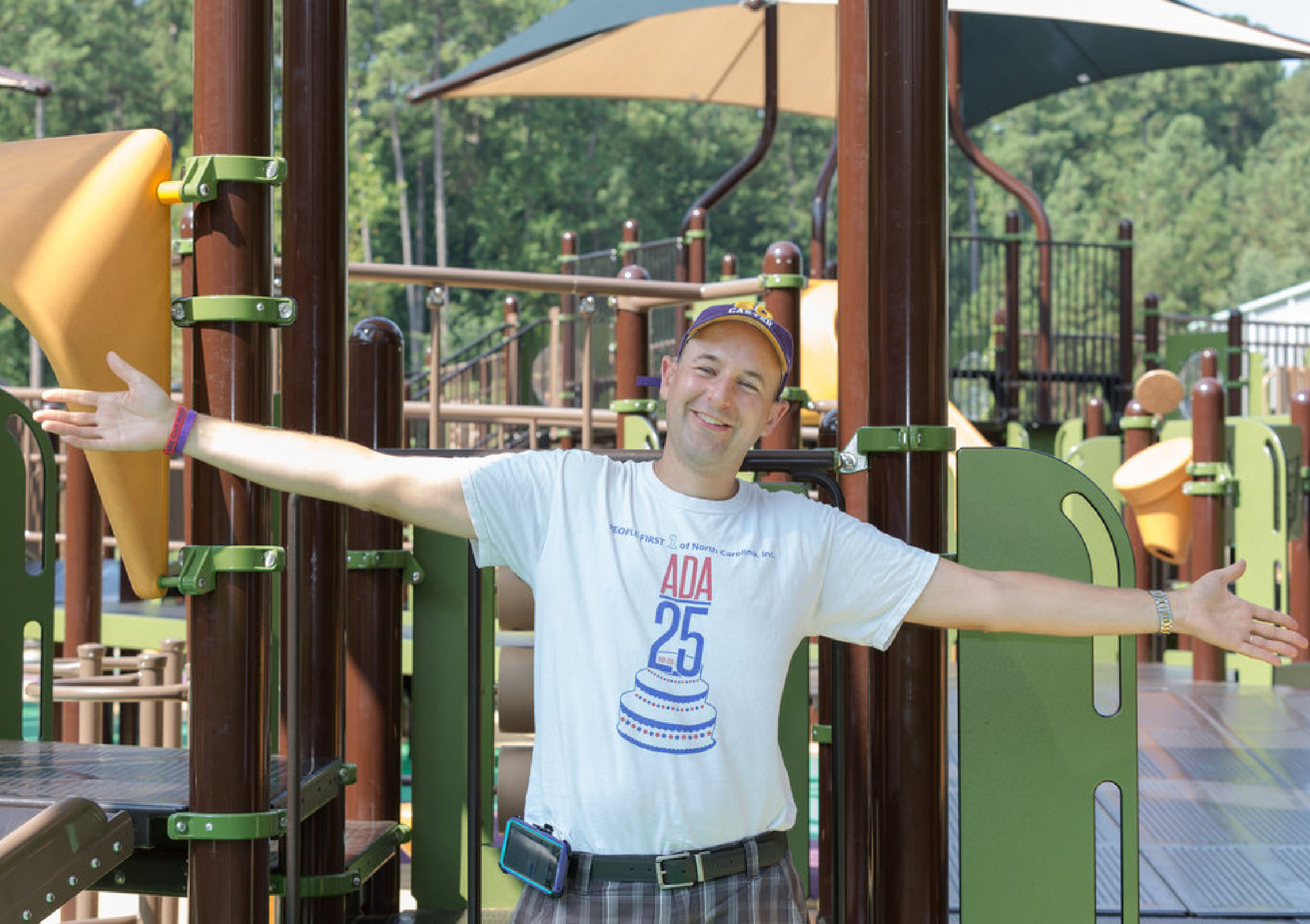HHis nickname at William & Mary was “Phil Butterfly.” • As a student, Philip Woodward ’01, J.D. ’04 was known as an outgoing and gregarious person who would decorate dorm-room doors of friends and classmates with balloons and pictures on their birthdays.
Change Maker
Philip Woodward '01, J.D. '04 is dedicated to making society work better for people with disabilities
May 12, 2023
By
Tina Eshleman
In keeping with his social butterfly persona, he founded a society called the Butterfly Club that would anonymously distribute encouraging messages and surprises to brighten others’ days — accompanied by a butterfly sticker and a smiley face. He says the idea was inspired in part by a pair of greeting cards that the secret society 13 Club slid under his door complimenting him on his enthusiasm.
“William & Mary was a very welcoming environment and I embraced it,” he says. “After feeling shy and quiet while going through school, I was ready to ensure that I had a very positive social experience in college.”
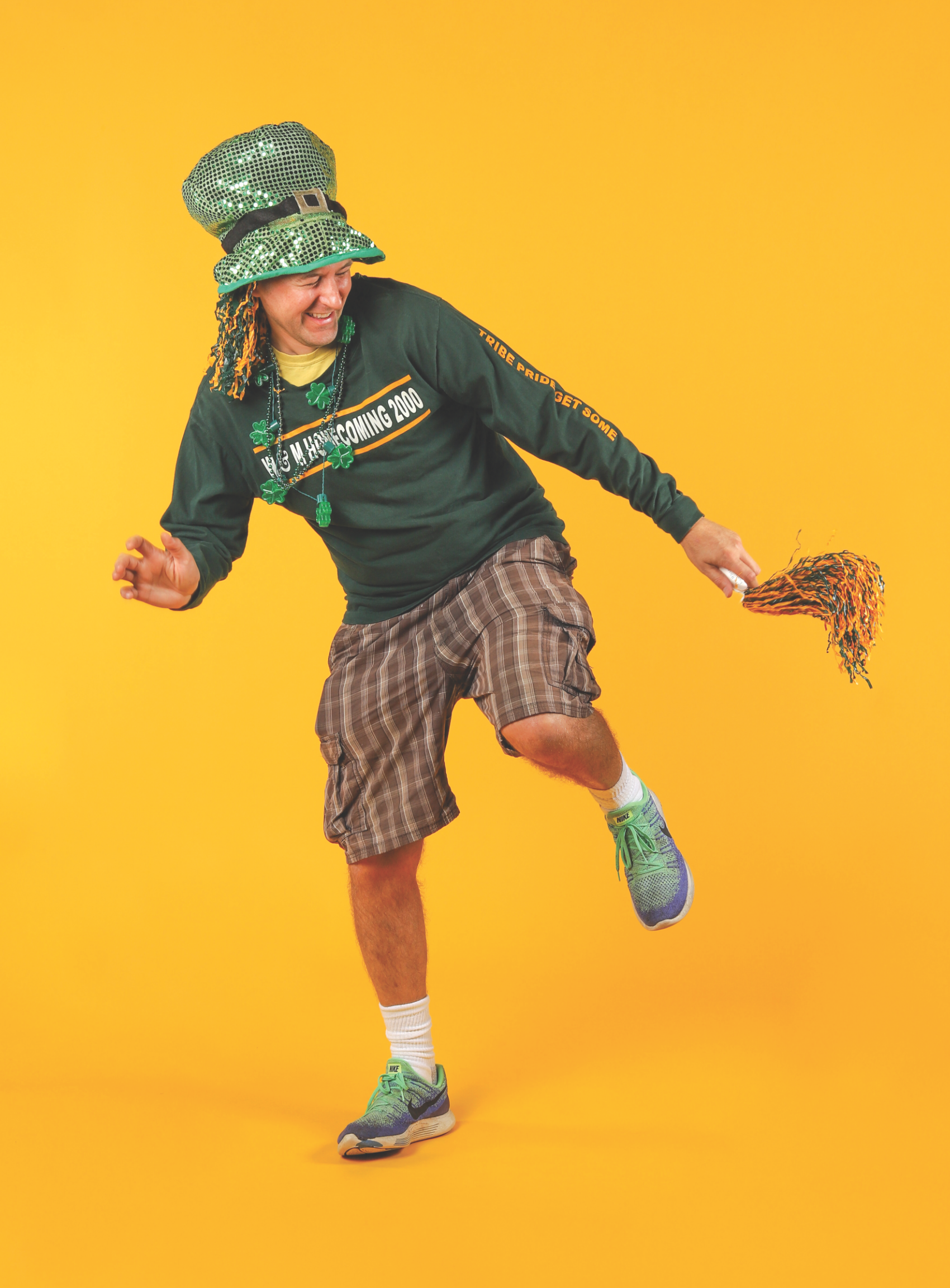
As someone who grew up hard of hearing, he sometimes endured teasing during his childhood because of his speech and the hearing aids he wears. His own circumstances made him more attuned to those around him who face barriers to inclusion, whether in a classroom, at the workplace or in a cultural or recreational setting.
During his freshman year in 1998, Woodward co-founded the William & Mary Sign Language Club and successfully petitioned for American Sign Language classes to be taught for academic credit. He also led an effort to provide signing at W&M Choir concerts.
Today, the advocacy work he began while he was a student continues in his role as a systems change manager at the North Carolina Council on Developmental Disabilities. There, he helps to ensure that people with disabilities can fully participate in their communities.
Woodward’s exuberance is contagious, says Sam Sadler ’64, M.Ed. ’71, retired vice president for student affairs at William & Mary. He recalls that the former student stood out at football and basketball games by wearing a shiny, neon green shirt — passed along to him by Lars Thorn ’99 — paired with a sparkly leprechaun hat.
At Commencement, Woodward received the John Kratzer Memorial Award for exemplary courage, self-sacrifice, leadership and spirit. His love for his alma mater is reflected in his current “tribeprideforever” email address, and he ends his messages with the signature line “Tribe Pridefully.”
“It’s hard not to be joyful when you’re around him,” Sadler says. “But there’s also a serious side of him. He clearly wanted to make William & Mary more open for people who had the condition he had, or something similar. When you sit and talk with him, it’s compelling — the person he is and the message he shares. He taught us that we can help people discover their power if we learn to communicate on their terms.”
‘I FELT THAT I COULD BE MYSELF’
Woodward was born with typical hearing, but when he was 4 1/2 years old, his preschool teacher noticed that he could not understand her if her back was turned to him. There was no identifiable cause of his hearing loss and he had become adept at communicating, which made the change difficult to detect.
“Apparently, I taught myself how to read lips,” he says. “I could have been fooling everyone for a while.”
Rather than enrolling him in a specialized program, his parents decided to have him attend an all-boys school in Richmond, Virginia, where they lived. He kept up with the lessons by sitting at the front of the classroom, reading the teacher’s lips and borrowing classmates’ notes if he missed something.
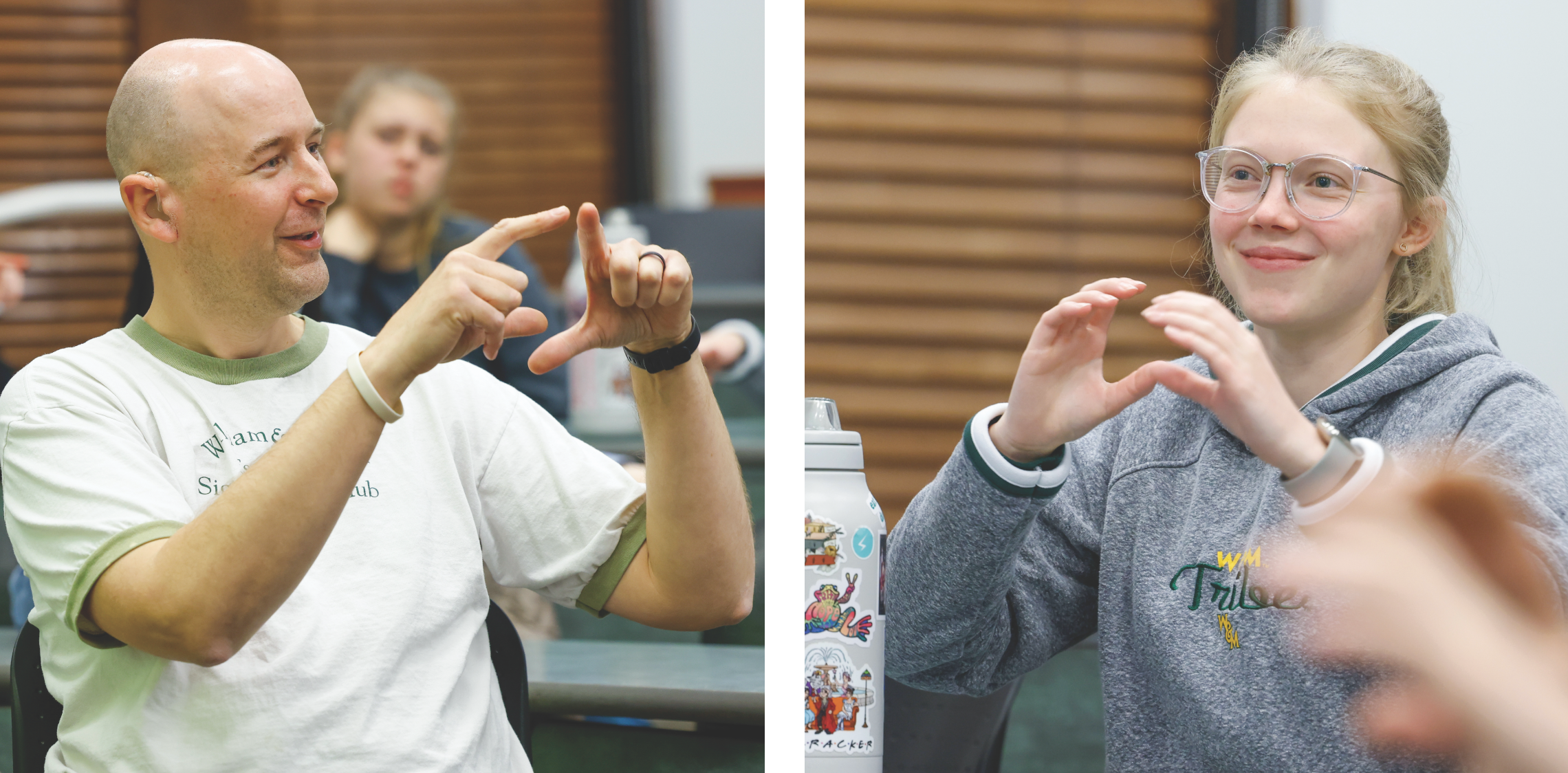
“I did not meet another deaf or hard-of-hearing person until the summer after seventh grade,” he says. That summer, he attended a camp for deaf and hard-of-hearing children and suddenly he felt out of place for a different reason: Everyone else seemed to know sign language.
When Woodward was in high school, he volunteered as a counselor at the camp. To prepare himself, he studied American Sign Language during an evening class through a community program.
“It was fun to learn sign language and realize that I could communicate with people without struggling to hear them so much,” he says.
After arriving at William & Mary, Woodward quickly came out of his shell. An English major with a passion for the Romantic poetry of Lord Byron and Percy Bysse Shelley, he immersed himself in campus life by participating in intramural activities, covering women’s golf and gymnastics for The Flat Hat and serving as a president’s aide and an orientation aide.
“Everybody was so friendly, I felt that I could be myself,” he says. “They also made a concerted effort to communicate with me and make sure I wouldn’t miss out on things.”
With support from Student Accessibility Services,Woodward would meet with professors at the beginning of each semester and make arrangements to sit in a place that provided a good vantage point to read people’s lips. The professor would ask for a volunteer to be a peer notetaker.
“That volunteer would take notes on carbon paper and give me a copy so I could read them and see things that I missed,” he says. Later, in law school, he used a service called CART (Communication Access Realtime Transcription) that provided a transcription of what was said in his classes.
For Woodward, being hard of hearing became a way to draw people in.
“At William & Mary, I met a lot of people who were genuinely interested in learning more about my hearing loss and learning sign language, so I appreciated having the opportunity to share that with them,” he says. “I taught people how to flirt in sign language, so they could point out a cute boy or a cute girl at a frat party. People liked learning that.”
After growing up with two brothers and attending an all-boys school for 13 years, Woodward reveled in a setting where women outnumbered men. An article about him in The Flat Hat in April 2000 observed that he appeared to know every female student who had lived Yates, his freshman dormitory.
Most significantly, he met the love of his life, Lyla Koch Woodward ’03. At the beginning of her freshman year in 1999, she saw Philip at her dorm, Barrett Hall, where he was working as an orientation aide. She had watched him signing “Our Alma Mater” with the W&M Choir at an event the previous day and asked if he would teach her sign language.
“I said, ‘OK, I’ll teach you,’ and we became friends,” he says. “She used to volunteer at a hospital where one of the young patients was deaf and she wanted to be able to communicate with people like that patient.”
About a year later, their friendship blossomed into romance, and they were married after Lyla’s graduation in 2003. By that time, Philip was attending W&M Law School.
“I wanted an opportunity to stay at William & Mary for three more years,” he says with a smile.
Being in Williamsburg also allowed him to spend time on campus with his younger brother, Stephen Woodward ’05, and introduce him to friends.
Stephen, who passed away unexpectedly in March 2022 at age 38, was an enthusiastic member of W&M Club Rowing, and his former teammates and the Friends of William & Mary Rowing established the Stephen “Woody” Woodward ’05 Memorial Rowing Endowment in his memory. Philip and Stephen’s parents, Richard Woodward P ’01, P ’05 and Elaine Woodward P ’01, P ’05, made a significant contribution to the endowment, deepening the family’s connection to William & Mary.
Before enrolling in William & Mary, Philip Woodward thought he might want to be a sports writer, but while at the university, he became more interested in advocating for people with disabilities.
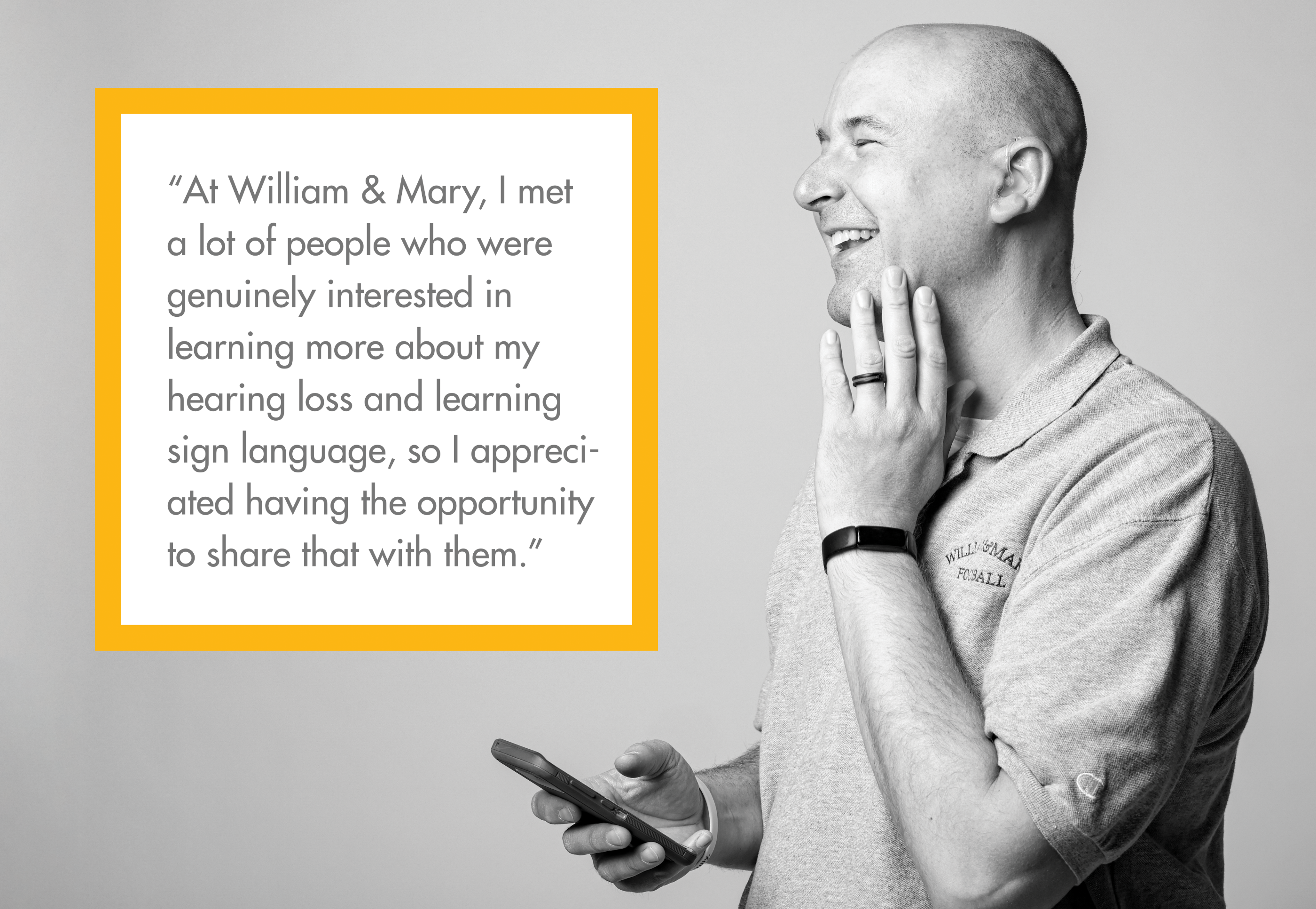
Partly, that was because of Lyla’s influence. A developmental psychology major, she told him about her experience working with children who had developmental disabilities. As a student, she volunteered at a program for children with special needs and befriended the family of a boy with a developmental disability. Lyla and Philip would sometimes babysit the boy and his sister.
“I was very interested in learning about disability law, but not necessarily intending to practice law,” Woodward says. “For the essay portion on my law school application, I wrote about advocating for people who are deaf and hard of hearing. Today I work with people with all types of disabilities, particularly those with intellectual and other developmental disabilities.”
A STRONG ADVOCATE
As a systems change manager with the North Carolina Council on Developmental Disabilities, Woodward works on policy initiatives and programs that improve the way state government and society interact with the estimated 200,000 people in North Carolina who have intellectual or developmental disabilities.
One example is a bill that was introduced in the North Carolina General Assembly in March to reform the state’s guardianship statute so that individuals with intellectual or developmental disabilities have more of a say in decisions that affect their lives.
“Many people with disabilities are placed in a full guardianship when they turn 18 and that severely restricts a person’s rights,” he says. “Their guardian can tell them what to wear, what to eat, whether they can work, who they spend time with and whether or not they can date and get married.”
The proposed legislation follows years of work by Woodward and his colleagues to educate and inform lawmakers on the issue. It would direct clerks of court to consider less restrictive alternatives before approving full guardianship.
“Many people with intellectual or developmental disabilities are fully capable of making their own decisions or can make decisions with support,” he says. “We want them to maintain as many rights as possible.”
Another initiative involved setting up a system called ABLE that provides accounts where people with intellectual or developmental disabilities can save money for disability-related expenses without risking the loss of Medicaid or Supplemental Security Income funds.
Changes in government, especially when money is involved, don’t happen overnight and the pace of progress can be frustratingly slow at times.
“In 2005, I started attending the meetings of the Raleigh Mayor’s Committee for Persons with Disabilities,” Woodward says.“One of the biggest things we would talk about is transportation for people with disabilities. Today in 2023, we still talk about transportation barriers for people with disabilities at every single monthly meeting.”
What Woodward finds most rewarding about his work is getting to know more people with disabilities and talking with them about their interests — whether that’s a sports team such as his beloved Minnesota Vikings or a popular singer like Harry Styles.
“There’s always something I can learn from another person, including someone with a disability,” he says. “If someone I know has been struggling to find a job and then they get hired, I’m happy for them. If they reach a goal that involves living in the community and doing something they want to do, it’s great to see them achieving their dreams.”
Before taking on his current role, Woodward worked alongside another William & Mary alumnus, Philip Protz ’87, at the North Carolina Division of Vocational Rehabilitation Services, where he helped people with disabilities find jobs.
“I was very excited to have Philip join our team a number of years ago,” says Protz, now director of program policy planning and evaluation for multiple North Carolina divisions that focus on meeting the vocational, independent living and communication needs of residents with disabilities. “We collaborated on addressing areas of accessibility together through working on rule revisions and through our legislative processes.”
The two Philips enjoyed playing pickup basketball at an on-site gym, Protz says, adding that Woodward “always had interesting trick shots.”
They also worked on increasing recreational opportunities for North Carolinians and tourists with disabilities. For Woodward, this involved visiting cultural and recreational sites all over the state and compiling a 480-page vacation and travel guide called ACCESS North Carolina, which provided practical information for people with physical or cognitive disabilities, and those who are deaf or hard of hearing or have vision loss.
“I cannot say enough about Philip and his extremely positive outlook and the encouragement he has brought to our team in general,” Protz says.
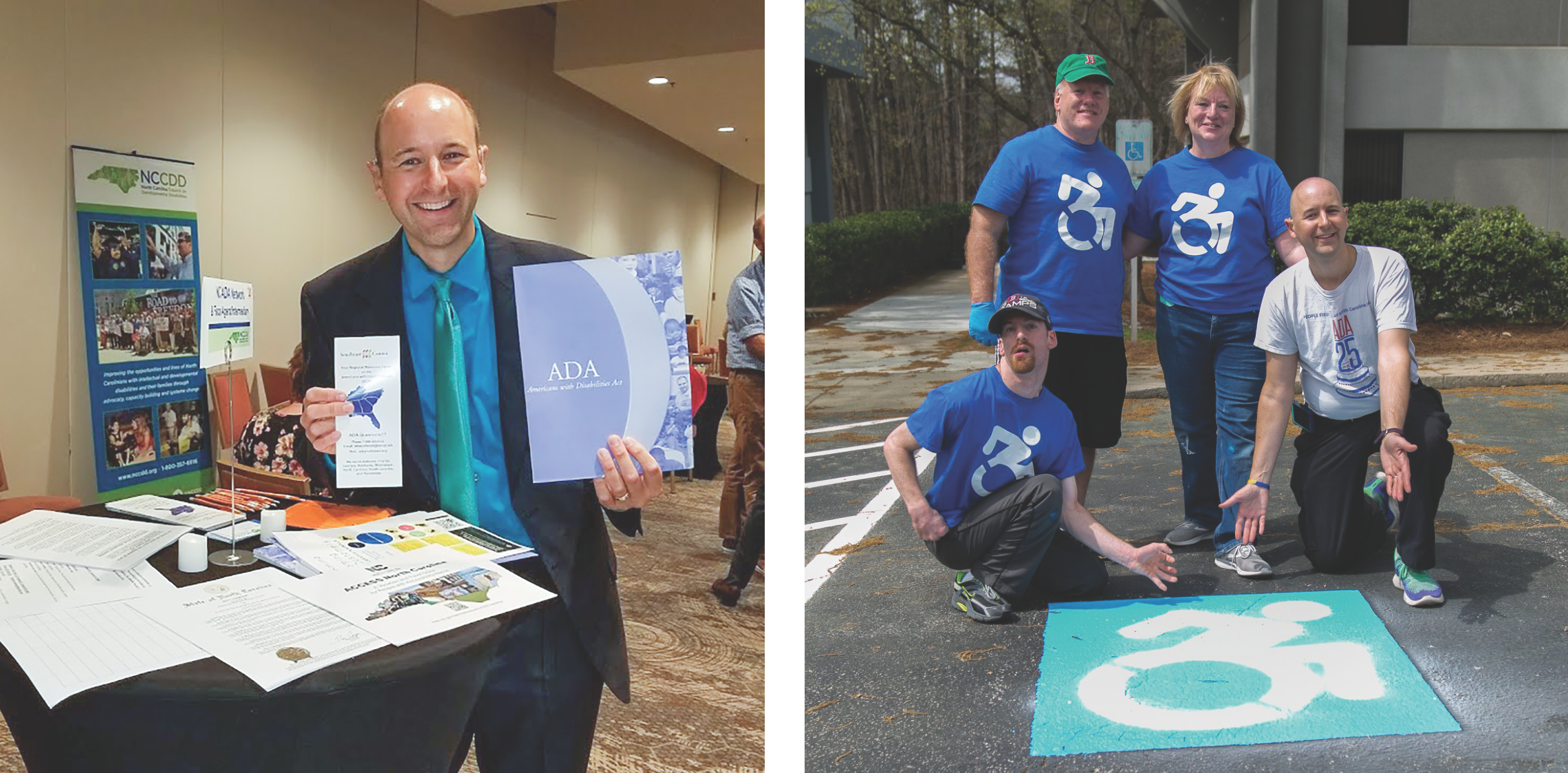
Woodward credits his William & Mary education with providing a solid foundation for his career in public service. “Majoring in English helped me become a strong writer and attending law school helped me become a strong advocate for people with disabilities.”
RENEWED CONNECTIONS
It doesn’t take much arm-twisting for Woodward to make the three-hour trip from his home in Knightdale, North Carolina, to visit campus and meet with current members of the American Sign Language (ASL) Club at William & Mary. So on a Thursday evening in late March, he arrives in Room 223 at James Blair Hall wearing a vintage W&M Sign Language Club T-shirt. After its founding, the club continued until at least 2006, and was restarted in 2014.
As club members introduce themselves using sign language to communicate their name, class year, major, and least favorite color and animal — sometimes by spelling the letters — Woodward teaches them signs for spider, mosquito and cockroach as well as computer science and major. He draws laughter when he reacts with mock horror after one student says she doesn’t like yellow: “You don’t like one of the two William & Mary colors?!”
He tells the students about the club’s origins and shares some of his own experiences as someone who is hard of hearing, such the challenge of reading people’s lips when most people wore masks during the pandemic.
“This Live Transcribe app is a lifesaver,” he says, showing them his cellphone. “I love it!”
When the club’s hourlong meeting time is over, Woodward remains for another hour answering questions and talking about life on campus.
“Having Philip join the meeting was a great opportunity because we got to learn more about what it’s like to be hard of hearing,” says Bella Strong ’25, secretary of the club that currently does not have any deaf or hard of hearing members.
After learning from Woodward that the club used to sign at W&M Choir concerts, Annamarie Warnke ’25, who is in the choir, spoke with the director about reviving the tradition, says ASL Club President Ella Briggs ’25.
“So next semester you might catch us signing along with Christmas carols again,” she says.
Briggs, a linguistics major, adds that she is looking into a career as an interpreter. “Meeting Philip really fueled that idea!”
Talking with the students inspired Woodward later to make a gift on One Tribe One Day to the Student Organization Fund, from which ASL Club members may request funding for T-shirts or other projects to spread awareness of ASL and Deaf culture on campus.
“It’s important that if you have a friend or family member with a disability, you do whatever you can to help them feel included,” Woodward tells the students as the meeting ends. “There are small things you can do, even something as simple as turning on closed captions when watching TV. If we could all do those things, wouldn’t the world be a better place?”
